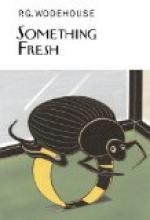But when Mr. Peters, making up his mind, leaped into the museum, Baxter’s suspicions lost their vagueness and became crystallized. Certainty descended on him like a bolt from the skies. On oath, before a notary, the Efficient Baxter would have declared that J. Preston Peters was about to try to purloin the scarab.
Lest we should seem to be attributing too miraculous powers of intuition to Lord Emsworth’s secretary, it should be explained that the mystery which hung about that curio had exercised his mind not a little since his employer had given it to him to place in the museum. He knew Lord Emsworth’s power of forgetting and he did not believe his account of the transaction. Scarab maniacs like Mr. Peters did not give away specimens from their collections as presents. But he had not divined the truth of what had happened in London.
The conclusion at which he had arrived was that Lord Emsworth had bought the scarab and had forgotten all about it. To support this theory was the fact that the latter had taken his check book to London with him. Baxter’s long acquaintance with the earl had left him with the conviction that there was no saying what he might not do if left loose in London with a check book.
As to Mr. Peters’ motive for entering the museum, that, too, seemed completely clear to the secretary. He was a curio enthusiast himself and he had served collectors in a secretarial capacity; and he knew, both from experience and observation, that strange madness which may at any moment afflict the collector, blotting out morality and the nice distinction between meum and tuum, as with a sponge. He knew that collectors who would not steal a loaf if they were starving might—and did—fall before the temptation of a coveted curio.
He descended the stairs three at a time, and entered the museum at the very instant when Mr. Peters’ twitching fingers were about to close on his treasure. He handled the delicate situation with eminent tact. Mr. Peters, at the sound of his step, had executed a backward leap, which was as good as a confession of guilt, and his face was rigid with dismay; but the Efficient Baxter pretended not to notice these phenomena. His manner, when he spoke, was easy and unembarrassed.
“Ah! Taking a look at our little collection, Mr. Peters? You will see that we have given the place of honor to your Cheops. It is certainly a fine specimen—a wonderfully fine specimen.”
Mr. Peters was recovering slowly. Baxter talked on, to give him time. He spoke of Mut and Bubastis, of Ammon and the Book of the Dead. He directed the other’s attention to the Roman coins.
He was touching on some aspects of the Princess Gilukhipa of Mitanni, in whom his hearer could scarcely fail to be interested, when the door opened and Beach, the butler, came in, accompanied by Ashe. In the bustle of the interruption Mr. Peters escaped, glad to be elsewhere, and questioning for the first time in his life the dictum that if you want a thing well done you must do it yourself.




